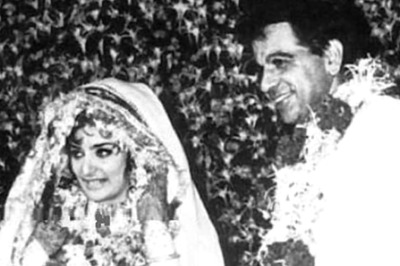
views
Tripoli: Battle-hardened Libyan combatants joined the fight to capture a desert town from well-armed loyalists of Muammar Gaddafi on Sunday after the head of Libya's interim council warned that the ousted leader still posed a threat.
Gaddafi troops firing rockets and mortars held up local fighters trying to push into the northern outskirts of Bani Walid, which lies 150 km southeast of Tripoli.
Scores of uniformed soldiers and experienced fighters of the ruling Transitional National Council (NTC) reinforced their comrades who have met fierce resistance from Gaddafi forces since Friday, saying they would attack within hours.
"I've been a soldier in the Libyan army in the 1980s. I have a little bit more experience than these local boys," said one new arrival, Omar Swaid, a truck driver from Kansas.
"They are great - very enthusiastic but they don't know how to fight. We're going help them. The Gaddafi forces, some want to surrender. I hope this is the last fight. I don't want to see any more blood," he said in a broad American accent.
NATO warplanes again patrolled the skies after launching several air strikes the day before.
"In the vicinity of Bani Walid there was one rocket launcher we destroyed," a NATO official in Brussels told Reuters on Sunday. In a statement, NATO said its planes also hit a tank and two armored vehicles in the area.
Ibrahim Bakkar, a 20-year-old fighter outside Bani Walid, said, "NATO dropped many bombs yesterday, targeting Grad rocket launchers. It is really helping us. When we enter the city, NATO should give us more protection from the sky."
The original plan was for local men to enter the town of 100,000 to reassure residents and to encourage Gaddafi fighters to lay down their weapons and stay indoors.
But NTC officials, who first estimated they were facing only 150 Gaddafi loyalists, now say their opponents number about 1,000 after an influx of extra men from other Gaddafi strongholds such as Sirte on the coast and Sabha in the south.
"Last night the enemy fired many Grad rockets and mortars. We were under a hail of Grads. We don't know what we're going to do now. I have to admit, they have more experience than us," said Mohammed Ibrahim, a local anti-Gaddafi fighter.
Getting a grip
It is vital for the NTC to capture Gaddafi's last strongholds and find the fugitive former leader to assert its grip over the vast oil-producing North African country and begin a countdown to elections and a new constitution.
NTC chairman Mustafa Abdel Jalil, a former Gaddafi justice minister who had run the council from the eastern city of Benghazi, arrived in Tripoli on Saturday for the first time since bands of anti-Gaddafi rebels captured it on August 23.
"Brotherhood and warmth - that's what we will depend on to build our future. We are not at a time of retribution," Abdel Jalil declared. "This is the time of unity and liberation."
The NTC has said it will complete its move to Tripoli this week, although previous timelines for this have slipped.
Establishing a credible interim government in the capital would mark an important step for Libya, where regional and factional rivalries among forces united only by contempt for Gaddafi could trouble efforts to reshape the country.
The NTC is anxious to show it can restart oil production, virtually stalled since the civil war began six months ago.
Interim Oil and Finance Minister Ali Tarhouni said on Saturday oil would be pumped at some fields within days and pre-war output levels would be restored within a year.
But Abdel Jalil said Libya could not yet be declared "liberated" from the man who ruled it for 42 years.
"Gaddafi still has money and gold," he said. "These are the fundamental things that will allow him to find men."
The NTC had given Sirte, Sabha and Bani Walid until Saturday to surrender or face attack, although fighting around Sirte and Bani Walid erupted a day before the deadline.
Anti-Gaddafi fighters believe one or two of the ousted leader's sons may be holed up in Bani Walid. Some NTC officials have even suggested Gaddafi might be there.
Several former Gaddafi officials and generals have fled to neighboring Niger. The toppled leader's wife and three of his children found sanctuary in Algeria last month.
The struggle for Bani Walid appeared far from over.
Abdulkarim el Elwani, a former Libyan army soldier who defected, now commands a unit of about 100 men who arrived at the front on Sunday, visibly better-equipped and in uniform.
"They asked us to come here because the Bani Walid rebels have failed to take the city," he said. "There's a lot of resistance. We have orders to advance in two hours."




















Comments
0 comment